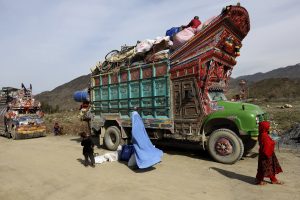Pakistan has ordered millions of illegal immigrants living in the country to leave by October 30. The decision has raised concerns about the fate of around 1.7 million undocumented Afghan refugees residing in Pakistan.
In order to avoid unrest and bloodshed in their own country, millions of Afghans have been crossing the border for decades. Many have lived in Pakistan for years. Most recently, thousands of people crossed into Pakistan the border after the Afghan Taliban seized control of Kabul in August 2021.
For years, Pakistan has generously accepted these refugees despite the cost to its security and financial stability.
Pakistan’s plan to begin deporting illegal immigrants has drawn criticism from the Afghan Taliban, who claim that the refugees are not engaged in violent activity. “The behavior of Pakistan against Afghan refugees is unacceptable,” Zabiullah Mujahid, the Afghan government’s official spokesman, said. “The Pakistani side should reconsider its plan.”
The timing of Pakistan’s decision is noteworthy. It coincides with the country’s introduction of stringent trade terms with Afghanistan.
The economic measures aim to curb the damage caused to the national economy and external sector due to the misuse of the Afghan Transit Trade Agreement (ATTA). Pakistani customs officials believe that some products that Afghanistan imports through Pakistani ports under ATTA are illegally sent back to Pakistan. The smuggling of these commodities into Pakistan has resulted in multi-billion-dollar tax evasions at a time when Pakistan’s economy is already under extreme strain.
The abuse of ATTA has had adverse effects on Pakistan’s economy, making it imperative for the government to take corrective actions. By implementing stricter trade terms, Pakistan is apparently taking proactive steps to protect its economic interests. Pakistan has already seen the positive impact of its crackdown on Afghan smuggling routes and the people who were behind them; in September, the Pakistani rupee became the best-performing currency against the U.S. dollar.
The impact and scope of smuggling connected to Afghanistan, along with the Afghan Taliban’s failure to work with Islamabad to address the latter’s security concerns over the Tehrik-e-Taliban Pakistan (TTP), have perplexed Pakistan’s policymakers.
The move to deport illegal immigrants and restrict their illegal activities comes at a time when militant attacks, mainly carried out from Afghanistan, have multiplied in Pakistan.
According to recent intelligence reports, Afghan nationals are reportedly joining the ranks of the TTP, going against the orders of their supreme commander, Hibatullah Akhundzada, and actively facilitating the militant group’s operations against Pakistan. The interior minister of Pakistan recently disclosed that 14 of the 24 suicide attacks that occurred in Pakistan in 2023 involved Afghan citizens. In addition, the Khyber Pakhtunkhwa Inspector General of Police (IGP), Akhtar Hayat Khan, said that 75 percent of the suicide attacks committed in the province during the most recent wave of terrorism featured Afghan nationals.
These developments essentially mean that Islamabad is unlikely to respond sympathetically to the Afghan Taliban’s call for Pakistan not to deport or maltreat illegal immigrants. Additionally, no one in Islamabad is prepared to accept Kabul’s claim that Afghan citizens are not complicit in undermining Pakistan’s security.
No country in the world accepts undocumented residents of any status who might jeopardize their security, and Pakistan is taking the appropriate precautions to safeguard its interests by deporting refugees.
Afghan Taliban cannot expect goodwill from Pakistan when they are sheltering militant groups like the TTP that have carried out countless attacks in Pakistan for years.
It is time the Afghan Taliban realized that the days of sheltering the TTP and other militant organizations along Pakistan’s border without implications are long gone. Pakistan no longer has any willingness to engage in discussion with the TTP. The only options left are surrender or a reasonable agreement that may put the TTP in a position where they are no longer a threat to Pakistan.
For more than two years, Pakistan has attempted to talk with the Afghan Taliban over the TTP without result. Pakistan has also made a series of economic concessions to help Afghanistan’s economy, but all of these moves appear to have been a mistake as Kabul continues to dismiss Pakistan’s worries.
The stubborn refusal of the Taliban regime to work with Pakistan on security issues, the weak visa regime, the fate of illegal immigrants, and other trade-related issues appear to be the driving force behind Pakistan’s recent punitive moves.
It is evident that Pakistan is now willing to use all available means to punish the Taliban, even though it hasn’t yet targeted TTP safe havens in Afghanistan.
Pakistan’s restrictions might have a severe negative impact on Afghanistan’s landlocked economy, which is dependent on Pakistan for international trade. If Kabul continues to protect the TTP at the expense of Pakistan’s economy and stability, Pakistan would be obliged to take even more stringent measures.

































